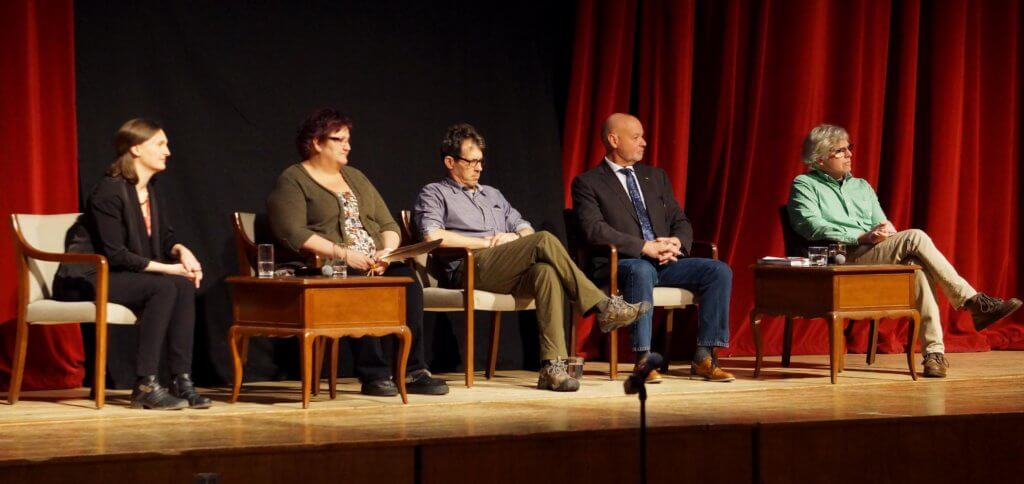Concern over hospital cuts brings together Sackville residents, administrators and Mt. A students

On Feb. 26, hundreds of community members filled Convocation Hall to discuss the health-care reforms proposed by the provincial government earlier this month. The community meeting was hosted by leaders in the Memramcook-Tantramar region including MLA Megan Mitton, Fort Folly First Nations Chief Rebecca Knockwood and Sackville Mayor John Higham. Also in attendance were Beauséjour Green party representative Laura Reinsborough (who facilitated the event), Sackville family doctor Allison Dysart and retired physician Ross Thomas.
On Feb. 11, the government of New Brunswick, alongside Health Minister Hugh Flemming and the CEOs of the province’s two health-care networks, announced that six rural hospitals would be set to close their emergency rooms during overnight hours. The Sackville Memorial Hospital, in addition to the overnight closure of its ER, would be forced to move its day-surgery program to Moncton and convert acute-care beds into long-term care beds.
On Feb. 16, after receiving strong backlash from rural New Brunswickers in response to the proposed reforms, Premier Blaine Higgs announced that the closures would be postponed to allow for community consultations. At the meeting, Mitton said that it is unclear what these consultations will look like. The meetings are scheduled to take place in April or May.
Despite the pushback, Flemming, Vitalité Health Network CEO Gilles Lanteigne, and Horizon Health Network CEO Karen McGrath will likely still proceed with the reforms after consultations have taken place. “It was very clear that they still love this plan,” said Mitton at the meeting. “They feel that our communities and citizens of New Brunswick just don’t understand and just aren’t willing to listen, and that we’re too emotional.” Mitton said that the way that the reforms were rolled out was “very insulting and unfair.”
During the meeting, Mitton announced the formation of a 12- to 15-member interim committee to “push back and offer a different perspective” to Higgs when he visits Sackville in the spring. The committee, still in early stages, will be co-chaired by Chief Rebecca Knockwood and Mayor John Higham, with representatives from all affected areas in the Memramcook-Tantramar region.
Mitton would like to see representatives from the Mount Allison community, the MASU, the medical community and the hospital auxiliary on the committee as well. The committee is looking for expertise in areas such as data analysis and communications, in addition to the personal experiences of patients, relatives of patients and medical professionals. “It’s a bit messy, but direct democracy is what we need,” said Mitton.
According to Knockwood, the proposed reforms to six hospitals would negatively affect five First Nations communities. “Five chiefs are being very vocal about this and they’re not going to let this slide,” she said. She added that she had scheduled a meeting with Higgs for Feb. 27 regarding the cuts, however Higgs cancelled at the last minute. “He doesn’t want to deal with people, especially First Nations.”
[su_carousel source=”media: 11378,11377,11376″ link=”lightbox” target=”blank” width=”900″ height=”400″ responsive=”no” items=”1″]
Higham said that he was pleased to see the pushback from rural New Brunswick after the government’s initial announcement. “To remove that within five or six days is phenomenal,” he said. “There was a lot of feeling that, unfortunately, rural areas could be picked off on public policy because they’re just so small it doesn’t really matter.” He also said that the overnight hospital closures have negative impacts on other, smaller rural communities. According to Higham, some smaller health-care systems rely on services provided by the affected rural hospitals.
Dysart argued that the proposed cuts will worsen the province’s medical personnel shortage, and therefore patient care. He said that surgeries in regional hospitals like Moncton are already being regularly cancelled due to lack of medical personnel, and patients are being cared for in hospital hallways while they wait for a bed. The Sackville nurses who had been given layoff notices at the beginning of February (which have since been rescinded), are already looking for jobs elsewhere because they feel their jobs here are no longer secure.
Dysart also noted that in Moncton, where many services will be moved if the cuts are to go forward, 15,000 people do not have family doctors. “So, when you think about the big reforms they were going to do, how does that deal with any of the real challenges New Brunswick is facing in health care?” he said. “In fact, I think it makes them worse.”
Thomas said that the cuts have already lessened people’s trust in both of the province’s health networks. “I think they’ve done more harm to recruitment in these past two weeks than all the good they’ve done in the past several years,” he said.
Élise Vaillancourt, the MASU’s VP external, raised the point that campus emergencies disproportionately happen between the hours of 10 p.m. and 8 a.m. “Since this announcement, we’ve heard from a lot of students that they’re really scared for what happens when their friend gets sick at two in the morning,” she said. She also added that many students cannot afford the $80 cab fare to or from Moncton, which she says is “unacceptable for a population of students who have the highest debt load in the country.”
Sackville representatives intend to continue to lead the fight against the proposed rural health-care reforms. If you or anyone you know is interested in helping contribute skills or experience to the committee, the town asks that you fill out the engagement form using the link bit.ly/chcsc.





